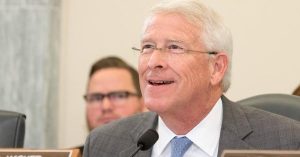
U.S. Sen. Roger Wicker’s (R-MS) bipartisan legislation to improve the nation’s coordination on assessing and acquiring unmanned maritime systems is set to become federal law following U.S. Senate passage of the measure on Dec. 17.
The Senate on Monday unanimously approved the Commercial Engagement through Ocean Technology (CENOTE) Act of 2018, S. 2511, and on Thursday presented the bill to President Donald Trump for his signature to make it law. The U.S. House of Representatives approved the bill by voice vote on Dec. 10.
“I am hopeful President Trump will sign this bill soon so that we can begin to see the benefits for our defense, environment, commerce, fisheries, and disaster planning efforts,” said Sen. Wicker, who sponsored S. 2511 on March 7 and introduced the bill with original cosponsor U.S. Sen. Brian Schatz (D-HI).
S. 2511 will advance the National Oceanic Atmospheric Administration’s (NOAA) use of unmanned maritime systems, encourage private sector research and development, and ensure that marine data is readily available for use by academic, national security and commercial interests, according to a summary provided this week by Sen. Wicker’s office.
“Unmanned maritime systems are revolutionizing the way we explore our nation’s oceans,” Sen. Wicker said. “This legislation will provide a much-needed boost to NOAA’s efforts to harness the capabilities of this technology by leveraging the Navy’s expertise.”
The U.S. Navy has committed significant resources to advance unmanned maritime systems, which are remotely piloted or autonomous vehicles designed to gather ocean data, according to the senator’s statement, which noted that NOAA will coordinate with the Navy to bring unmanned systems data collection techniques to civilians.
The measure also will benefit the Gulf Coast’s so-called Blue Economy in the senator’s home state of Mississippi. According to the World Bank, the Blue Economy is “sustainable use of ocean resources for economic growth, improved livelihoods and jobs, and ocean ecosystem health.” Such an economy encompasses several activities associated with climate change: tourism, renewable energy, fisheries, maritime transport and waste management, according to the World Bank.
Increased investment in ocean technology that results from enactment of S. 2511 will benefit the Gulf Coast region because it’s one of the few sites in the United States where extensive testing of unmanned maritime systems is ongoing, according to the senator’s statement.
U.S. Rep. Steven Palazzo (R-MS) introduced the same-named companion bill, H.R. 5196, also on March 7 in the House along with U.S. Rep. Jimmy Panetta (D-CA).



